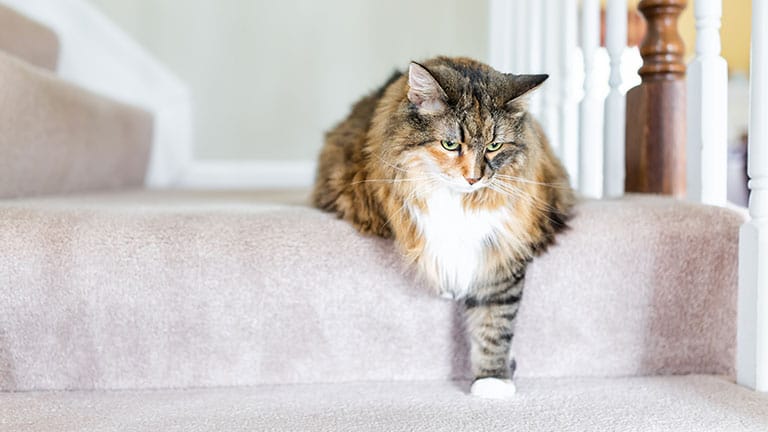Glucosamine for Cats : More About The Joint Supplement for Arthritic Cats
Contents of Article
Let’s take a critical look at glucosamine for cats, determining whether or not it really works, if it’s safe, and, if you choose to use it, how much you should give your cat.
What is glucosamine?
Glucosamine is an amino sugar that naturally occurs in the body, where it serves as a precursor to the polysaccharides that build cartilage and other tissues.
Glucosamine supplements are derived from shellfish exoskeletons and, occasionally, from fermented wheat, corn, or other grain-based mediums. It’s most often combined with chondroitin or methylsulfonylmethane (MSM), which are also believed to reduce inflammation and support joint health.
There are three types of glucosamine available for cats, dogs, and people suffering from arthritis. These are glucosamine hydrochloride, glucosamine sulfate, and N-acetyl-glucosamine.
It’s unclear which type of glucosamine is the most effective, if at all. That said, most of the research on glucosamine has involved glucosamine sulfate. Some believe that sulfate, as a natural part of cartilage production, may be an essential contributor to whatever benefits glucosamine sulfate provides.
Does glucosamine for cats work?
Cats usually take glucosamine for one of two reasons. The first is to treat joint problems, primarily arthritis. The second is to support the lining of the bladder and defend against urinary tract disease.
Glucosamine supplementation may be able to help with both of these conditions, but that possibility is slimmer than you might expect given glucosamine’s popularity and frequent recommendation by veterinarians.
In both cases, the theory behind glucosamine supplementation lies in the fact that glucosamine is present in the body and naturally does good things there, so it must be helpful if you provide more as a supplement. The only problem is that glucosamine doesn’t necessarily work that way.
Let’s take a closer look at how and if glucosamine supplements work, starting with glucosamine for cats with arthritis.
Glucosamine for Cats with Arthritis
It’s easy to understand why glucosamine should be able to support your cat’s joint health. Glucosamine is a precursor for glycosaminoglycans (GAG), a type of polysaccharide that’s a fundamental component of cartilage. Glucosamine supplementation should, at least in theory, promote cartilage regrowth and prevent further deterioration.
Instead of confirming that it’s an essential supplement for supporting healthy cartilage, studies of the benefits of glucosamine for people and animals have yielded mixed, and for the most part, disappointing, results.
An article on The SkeptVet blog concludes that “the majority of veterinarians and pet owners are still more influenced by personal experiences and anecdotes that suggest glucosamine is beneficial than by the solid research data that shows it is not.”
So what is the solid research data saying?
Research on cats and veterinary patients, in general, is limited, but it should be safe to extrapolate from the research on humans and other animals.
The largest study to date is the 2010 GAIT (Glucosamine/Chondroitin Arthritis Intervention Trial) study. Over the course of two years, researchers compared the results of three types of treatment on over 1,500 patients with osteoarthritis. The first was celecoxib, a popular NSAID sold under the trade name Celebrex. The second was either glucosamine alone or glucosamine and chondroitin combined. The third was a placebo pill.
Over the course of two years, researchers found that, compared to a placebo, neither glucosamine alone nor in conjunction with chondroitin showed clinically significant improvement in either pain or joint function. That said, celecoxib treatment had similarly insignificant results.
Other research has yielded more promising results, showing that glucosamine may be able to stimulate cartilage growth in rats and rabbits. It may also be able to reduce inflammation.
Though it doesn’t appear to be the reliable treatment that so many veterinarians, cat guardians, and arthritic people feel it is, glucosamine’s potential benefits for cats with arthritis are still up for debate and exploration.
Perhaps the biggest argument for trying glucosamine for cats with arthritis is the abundance of anecdotal evidence that it works. Glucosamine supplements come highly-recommended by those who use them. There are countless stories about glucosamine helping cats regain their pep and stay spry into old age.
Of course, we’re hearing these results from humans, who are prone to seeing what they want to see. One study on the caregiver placebo effect in dogs with osteoarthritis found that the phenomenon occurred in almost 40% of cases studied.
Glucosamine for Cats with Bladder Inflammation
Just as in the cartilage, glucosamine is a precursor for the building blocks of the bladder’s protective lining. Though some veterinarians have observed reduced bladder inflammation in cats who take joint supplements containing glucosamine, the current body of research doesn’t clearly back up these observations.
For example, one double-blind study of 19 cats with interstitial cystitis found that 83% of glucosamine-treated cats no longer had blood in their urine after 28 days, compared to 70% of cats given the placebo. Though the results did seem to show that glucosamine-treated cats were a little better off than those given a placebo, it’s unclear whether or not those results were statistically significant.
Another study on forty cats with a history of recurrent cystitis found no difference in recurrence rates between cats given a glucosamine supplement and a placebo.
Ultimately, there’s very little (non-anecdotal) evidence that glucosamine can help cats with bladder inflammation.
Is glucosamine safe for cats?
Among veterinarians, the general attitude towards glucosamine is that “it might not help, but it certainly can’t hurt,” and hence it’s recommended as a harmless step in the right direction.
Glucosamine doesn’t conflict with any drugs and isn’t contraindicated for cats with any health conditions.
There are limited reports that starting a glucosamine supplement may cause gastrointestinal upset, but this is purely observational and there’s no concrete evidence of a connection. In humans, these symptoms appear just as frequently among patients given a placebo.
How much glucosamine should you give your cat?
If you choose to give your cat glucosamine, follow the instructions on the manufacturer’s label. If you’re using a glucosamine supplement that’s not marketed for cats, the recommended feline dose is between 120 and 500 mg per day.
Glucosamine for Cats – Final Thoughts
Glucosamine for cats may be worth a try if your cat has joint problems or bladder inflammation, but there’s no guarantee that it will help.
Instead of relying on glucosamine alone, consider a system of anti-inflammatories, exercise, a healthy diet, and perhaps a joint supplement containing glucosamine.
Click here to read our guide to the best joint supplements on the market.
The same applies to those looking for something to treat their cats’ bladder inflammation. Glucosamine may be able to help, but you shouldn’t rely on it alone. A combination of stress reduction, a high-moisture diet, and anti-inflammatories will do a lot more than glucosamine alone.
With so much confusion over glucosamine’s efficacy as a supplement for cats, we’d love to hear your thoughts! Let us know in the comments if you have used glucosamine for your cat and whether or not you think it helped.







